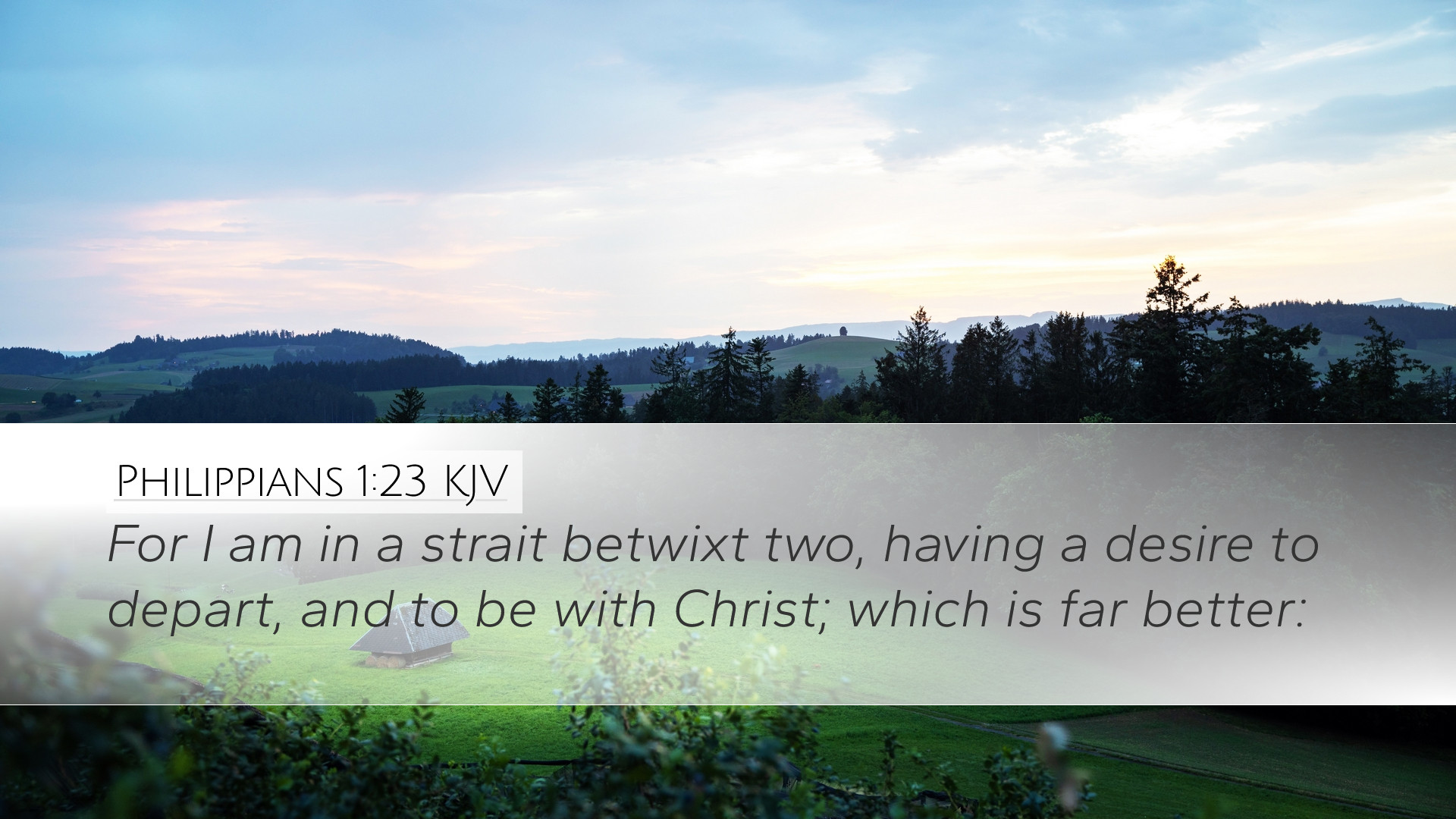Commentary on Philippians 1:23
Philippians 1:23 states: "For I am torn between the two: I desire to depart and be with Christ, which is better by far." This verse reflects the profound internal struggle that the Apostle Paul experienced as he contemplated the possibilities of life and death, and the implications of each for his spiritual journey and ministry.
Contextual Background
Paul wrote this letter while imprisoned, likely in Rome, facing uncertainty about his fate. His situation made him acutely aware of the tension between living for Christ and the prospect of being with Christ after death. Understanding this backdrop helps us appreciate the depth of Paul's struggle and longing.
Theological Insights
The verse offers rich theological insights regarding the nature of life, death, and the believer's ultimate hope in Christ. Below are some key themes drawn from public domain commentaries:
-
The Conflict of Desires:
Matthew Henry remarks on the duality of Paul's desires, emphasizing that both options—continuing to minister on earth or departing to be with Christ—held legitimate appeal. Paul was keenly aware that his earthly life was intertwined with the service of the Gospel, while his heart yearned for the ultimate fulfillment that comes from being in the presence of Christ.
-
Importance of Life in Christ:
Albert Barnes highlights that "to live is Christ" for Paul means that his life is fully committed to the work of the Gospel. His purpose for living centered on glorifying Christ and edifying others. The significant challenge for Paul is that, though he desires to serve, the burden of suffering weighs heavily on him.
-
Desire for Eternal Union:
Adam Clarke elaborates on the phrase "to depart and be with Christ." He explains that Paul discerns a greater good in departing this life, as it leads to an eternal union with his Savior. This highlights an essential Christian hope: the belief that death is a transition to a more profound communion with God.
-
The Hope of Resurrection:
In a broader biblical context, the hope of resurrection imbues Paul's thoughts. He understands that death is not an end but a doorway to a more splendid, eternal existence. As Paul navigates his impending fate, he reminds believers of the assurance found in Christ—an assurance that sharpens one’s focus on eternal realities.
Pastoral Applications
This verse serves as a profound reminder for pastors, students, and theologians of the weighty nature of life and ministry. The following applications can be derived:
-
Understanding Our Calling:
Pasting Paul's insight urges leaders to reflect on their calling. Are we living in a way that truly embodies "to live is Christ"? This will guide us toward a life devoted to service, contextualizing our existence in light of the Gospel.
-
Confronting Mortality:
Faced with the reality of mortality, believers can take comfort in the hope of being with Christ. This calls for honest dialogues about death in our communities, relieving fears and emphasizing resurrection and eternal life, encouraging the congregation to look beyond the immediate struggles.
-
Encouraging Hope:
In pastoral care, we can draw on Paul’s encouragement by helping others see that struggles in life can lead to hope in Christ. Just as Paul faced a tumultuous time, believers today can find solace in the promise that one day they will be with Christ, fostering a hopeful mindset amidst trials.
Concluding Thoughts
Philippians 1:23 is a succinct yet profound expression of faith. Paul illustrates the internal conflict between earthly ministry and the desire for heavenly fellowship, a tension that invites reflection. By contemplating life and death through the lens of Christ, we are spurred to actively seek His will in our lives while fostering a longing for the eternal. For scholars, students, and pastors alike, this verse provides an encouraging reminder of the richness of the Christian hope, serving as a guiding principle amidst the existential uncertainties of our journey.


